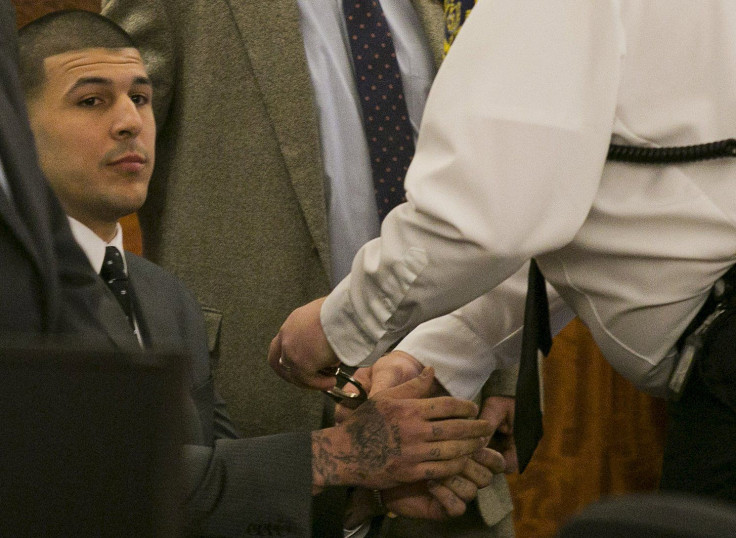Aaron Hernandez Life Sentence: What He Can Expect Behind Bars At MCI-Cedar Junction Walpole State Prison In Massachusetts

Shortly after a jury returned a guilty verdict against Aaron Hernandez for his role in the June 2013 shooting death of Odin Lloyd, the former NFL standout was sentenced to spend the remainder of his life in prison without the possibility of parole. The sentence, much like the gun alleged to be used for the murder, was automatic: In Massachusetts, being guilty of first-degree murder guarantees a lifetime behind bars.
Immediately following, a handcuffed Hernandez was led out of court, likely headed to his new home of MCI-Cedar Junction Walpole State Prison. The maximum-security facility is a far cry from the Bristol County House of Correction in North Dartmouth, Massachusetts, the jail where Hernandez spent the bulk of his incarceration awaiting trial.
#AaronHernandez's old home on the left and his new home on the right at MCI-Cedar Junction in Walpole, MA pic.twitter.com/eVDNleLlXQ
- John Bell (@NewsBell) April 15, 2015MCI-Cedar Junction boasts 20-foot-high walls, eight observation towers and five strands of electrical wire, according to the Boston Globe, which sent a reporter there in 2011 to document the state’s prison life. It’s unclear how much has changed there since then, when David Abel reported the food was “marginally edible and most [inmates] live in cramped cells with another prisoner, sharing a toilet and standing for six inmate counts a day.”
Upon his arrival at MCI-Cedar, prison policy calls for Hernandez to be stripped and have every orifice on his body thoroughly searched for contraband that includes but isn’t limited to metal objects and drugs. Fingerprinting comes next, after which he would be given his prison clothing -- gray scrubs, several pairs of underwear and canvas shoes without laces. The business suit he was wearing Wednesday in court would be either destroyed or mailed home. His multiple tattoos would be scrutinized for potential gang affiliations, something that has been speculated over but never confirmed.
It is unclear if Hernandez will be placed in protective custody – either by request or mandated by the prison – because of his high-profile celebrity status, but a current MCI-Cedar inmate who was notoriously known in the Greater Boston area because of media attention during his own murder trial was reportedly treated like an average prisoner while being admitted to the facility.
Jared Remy, son of legendary Boston Red Sox announcer and local celebrity Jerry Remy, was convicted in May of last year for killing his girlfriend and, like Hernandez, remanded to MCI-Cedar for the remainder of his natural life. Despite being widely known locally, that wasn't enough to make prison officials alter its admittance routine that Hernandez and his high-profile status would likely follow.
All new MCI-Cedar inmates are ultimately brought to orientation units with cell blocks that hold about 50 cells, according to WBUR reporter Steve Brown, who toured the prison in October 2012. Hernandez will either be able to leave his assigned cell freely to go to the chow hall or he will have food brought to him, depending on how great prison officials determine his security risk. After the orientation period of as long as a month, Hernandez could be integrated into the prison’s general population.
A film documented life “behind the walls’ in MCI-Cedar. It can be seen below in two separate parts.
MCI-Cedar inmates are permitted to enroll in employment programs such as working in food or janitorial services, according to the prison’s website, which indicated that “wages usually begin at $0.50 per hour” – a far cry from the $40 million contract he signed in 2012 with the New England Patriots that would have lasted at least through the 2018 season. At least $16 million of that contract was guaranteed.
The prison is located less than 2 miles from the place Hernandez's former employer calls home -- Gillette Stadium in Foxborough, Massachusetts, where the Patriots play. Hernandez was a "model citizen" in jail while awaiting trial last summer, and as such he was allowed to watch Patriots games on TV.
However, when his former team reached the Superbowl in January, Hernandez was in the throes of his murder trial. Because of that he was forbidden from watching the Patriots play -- and win -- the league's championship game. It is unclear what television privileges, if any, exist for MCI-Cedar inmates convicted of first-degree murder, or otherwise.
© Copyright IBTimes 2025. All rights reserved.






















